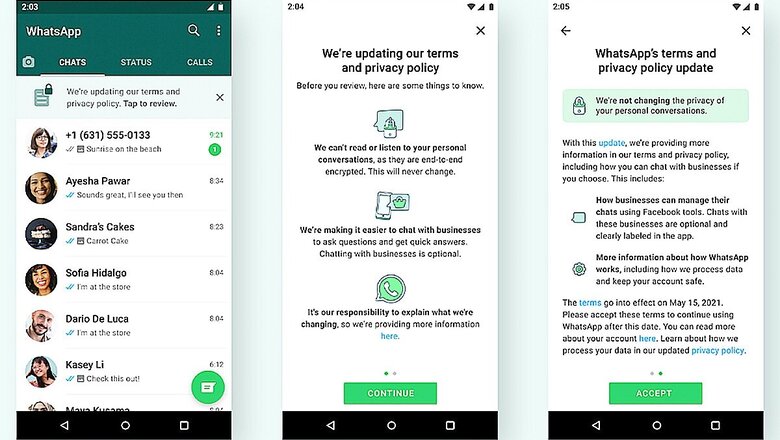
views
WhatsApp has decided to add a new in-app banner in order to inform you about its terms of services and privacy policy. In a newly published blog post, WhatsApp says that it has “reflected” on how it could have conveyed its privacy policy better to its users, which apparently includes projecting it more clearly to its users. In essence, WhatsApp is sticking to its stance on its privacy policy and the way it shares data with its parent company Facebook, and is insistent that this, in no way, compromises data security and privacy of communication on the most-used consumer chat application in the world.
“We previously encountered a great deal of misinformation about this update and we continue to work hard to clear up any confusion. As a reminder, we’re building new ways to chat or shop with a business on WhatsApp that are entirely optional. Personal messages will always be end-to-end encrypted, so WhatsApp can’t read or listen to them,” reads WhatsApp’s new blog post on the matter. It further states that alongside using WhatsApp statuses and the new in-app banner as ways to communicate its terms of service and privacy policy to users, it has included “more information to try and address concerns”.
Eventually, though, it isn’t giving users an option to opt out of data collection on the app, in any way. In other words, if you want to continue using WhatsApp, you will have to accept its terms of service and privacy policy by the new deadline of May 15. The rationale offered by WhatsApp is that its privacy policy in no way compromises the data security of its users, and most of its data collection practices applies to businesses and is directed to make business operations better and more cohesive for, well, businesses.
“Every day millions of people start a WhatsApp chat with a business because it’s easier to do so than placing a phone call or exchanging emails. We charge businesses to provide customer service on WhatsApp – not people. Some shopping features involve Facebook so that businesses can manage their inventory across apps. We display more information directly in WhatsApp so people can choose if they want to engage with businesses, or not,” says the new post.
WhatsApp also took a slight dig at other applications that have risen to prominence in the past few weeks, as the Facebook-owned service faced flak worldwide for its new privacy policy. The dig was largely aimed at Telegram, more than others, for its lack of offering end-to-end encryption as a default or standard feature in all chats. “We’ve seen some of our competitors try to get away with claiming they can’t see people’s messages – if an app doesn’t offer end-to-end encryption by default that means they can read your messages,” the post read. It also appears to believe that users are okay with sharing “some limited data”, as a trade-off for reliability.
In a recent Supreme Court notice, WhatsApp was asked to explain why its applicable privacy policy was different in Europe, in comparison to India. In response, WhatsApp’s legal representative in India argued at the apex court that the European General Data Protection Regulation (GDPR) prevented it from applying its policy in the region. Advocate Kapil Sibal argued in court that if India’s data protection bill is passed as law, WhatsApp will oblige and comply with the same. The apex court, however, found its argument inadequate, and asked the company to issue a response within four weeks. After facing backlash around the world, WhatsApp postponed its compulsory February 8 deadline of accepting the new privacy policy to May 15, and the same applies for India as well.
Since then, it has repeatedly attempted to convince users that it does not divulge private data metrics with Facebook, and largely restricts its data sharing practices with business conversations. However, privacy advocates have maintained that WhatsApp’s sharing of user metadata with Facebook is the antithesis of maintaining user privacy, attracting scrutiny to the app’s practices with private user data. With its new post, WhatsApp appears to clarify that while it will attempt to further clarify its stance in the near future, it will not stand down from its data collection policy that it has in place right now.
Read all the Latest News, Breaking News and Coronavirus News here




















Comments
0 comment